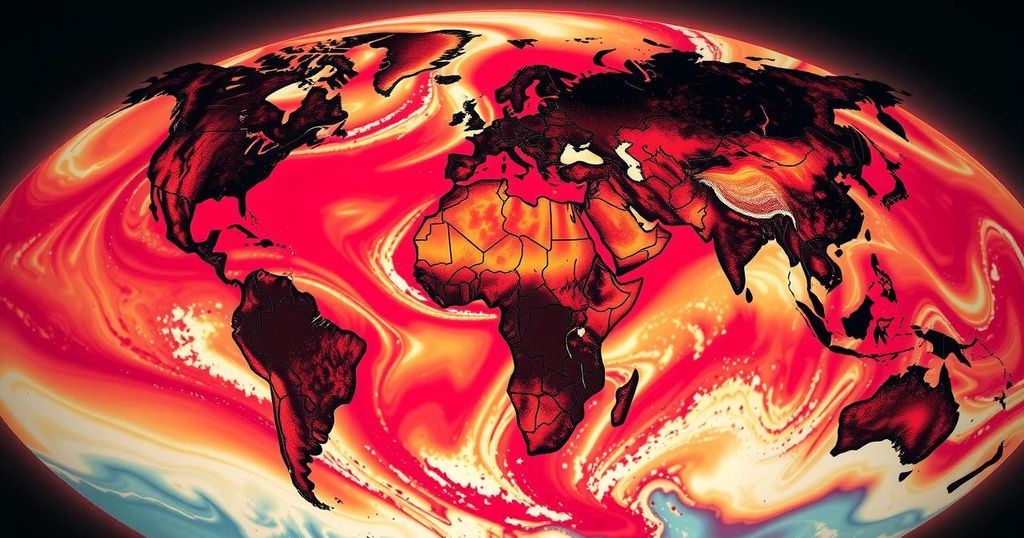The year 2024 has officially become Earth’s hottest year recorded, driven by rising greenhouse gas emissions, leading to extreme weather phenomena such as hurricanes, floods, and heat waves. This alarming trend reflects a clear association between human-induced climate change and increased weather intensity as reported by various climate agencies. Urgent actions are essential to mitigate further temperature increases and their associated impacts.
Climate science agencies from renowned institutions in the U.S., U.K., Europe, and Japan have confirmed that 2024 has set a new record as the hottest year on Earth. This alarming milestone is attributed to escalating greenhouse gas emissions, which have driven global temperatures beyond the previous year’s record. Both the average sea surface temperatures and the overall atmospheric water vapor levels also reached unprecedented highs in 2024, leading to exacerbated weather phenomena such as intense storms and significant flooding, as reported by the Copernicus Climate Change Service (C3S).
Samantha Burgess, Deputy Director of C3S, emphasized that the combination of elevated global temperatures and increased atmospheric water vapor has resulted in extreme heat waves and heavy rainfall, severely impacting millions. Furthermore, Gavin Schmidt, Director of the NASA Goddard Institute for Space Studies, noted that the correlation between human-induced climate change and extreme weather patterns is becoming increasingly evident. He stated, “It is very clear that the heat waves we are seeing would not be happening, intense rainfalls we are seeing almost everywhere would not be happening without anthropogenic warming.”
Significant weather events in 2024 included Hurricane Helene, which caused over 230 fatalities across several U.S. states, a record-early heat wave in Mexico, flash flooding in Spain, and severe drought conditions in South America, affecting the Amazon River’s water levels. Russell Vose from NOAA conveyed expectations for continued extreme weather as global temperatures rise while acknowledging that diverse factors—ranging from natural variability to human habitation in vulnerable regions—also play roles in these disasters.
Several elements, including an early El Niño cycle and diminished cloud cover, contributed to the warming trend in 2024. However, experts underscore that the predominant driver remains the growing concentration of greenhouse gases in the atmosphere, primarily from fossil fuel combustion. Schmidt remarked, “The global mean temperature will continue to rise as long as we continue to emit greenhouse gases.”
The data indicates that the average global temperature is nearing the critical threshold of 1.5 degrees Celsius above preindustrial levels, previously agreed upon in the Paris Climate Agreement. Burgess warned that with the current trajectory, we are at risk of surpassing this critical limit, as the average temperature over the past two years has already exceeded it.
Michael E. Mann, a noted climate scientist, cautioned that the temperature trend is likely to exceed the 1.5-degree threshold within the next decade if emissions continue at the current rate. He stressed the importance of focusing on emissions reduction to limit future warming. Amidst these discussions, climate-driven disasters persist, with Mann highlighting the severe wildfires in Southern California as a stark reminder of the ongoing impacts of climate change.
The article delves into the urgent issue of climate change, particularly emphasizing 2024’s record-setting heat. It cites multiple reputable global climate agencies that collectively confirm the alarming trend of rising global temperatures alongside an increase in extreme weather events. The ramifications of this warming trend extend well beyond temperature increases, impacting weather patterns and human safety. Notable experts and organizations provide critical insights into the climate crises, illustrating the interplay between human actions, natural phenomena, and the forecasts for the future of our planet.
In conclusion, 2024’s designation as the hottest year on record underscores the profound implications of climate change on both the environment and human life. With both sea surface temperatures and atmospheric water vapor at unprecedented levels, the resultant extreme weather events pose significant risks. The need for urgent action to mitigate greenhouse gas emissions is emphasized to avert surpassing critical global temperature thresholds, thereby minimizing catastrophic consequences. Continued awareness and prompt action are crucial in addressing this escalating crisis.
Original Source: www.newsweek.com






